A Case for Hugging Trees
Empathy in Living On The Grid
Written by Justin Ramsey
Re:generation is a special series of articles responding to Generation Hot at the 2016 Vancouver Fringe Festival. This is part 3 of 5.
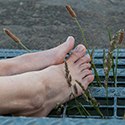
I remember when the UN Climate Change Conference happened in Paris. The cause was so simple, so dire, that swift and immediate action should have been taken. No more oil and gas; these aren’t viable options going forward. Watching as the politicians dragged their feet and sat on their hands, you’d think that renewable, clean energy and electric cars were weird hypothetical concepts – not real things that have existed in efficient, accessible formats for decades. Photovoltaic cells, for example – that’s a fancy term for solar panels – have existed in their present, functional form since 1952. Electric cars were ready to roll in the mid-1990s until pressure from oil companies, and compliance from politicians, saw them axed from the market.
The pledges to the Paris Agreement were non-committal. Even if countries do commit, they don’t have to begin their initiatives until 2020. And even if they do begin these initiatives, scientists have shown that their promised measures aren’t adequate enough to keep average global temperatures within 2ºC of pre-industrial levels. And still the world leaders smiled for their photo ops and extolled the conference’s success. So, with the consequences of climate change being as dire as they are, why the middling?
To put it bluntly, integrity has been bought. We’re kissing somebody’s ass. I don’t know whose, precisely; but I assume he has a fat wallet in that very deep back pocket.
As I meander back to the paid parking lot on Anderson Street at Granville Island, the Fringe Festival is in full swing; I pass an outdoor show near Opus Frames, where a huge white weather balloon bounces between the performer and his audience – until a sudden gust of wind throws the prop sideways, and the actor dashing after it; the Waterfront Theatre, its yellow sign lit cheerfully against the dark blue evening, has a wall of theatregoers lined against it; Fringe Festival volunteers, with their orange lanyards, bustle every which way. The milieu is calmer in the paid parking lot on Anderson Street, where Generation Hot is being staged, although the programme of three performances has drawn a packed house by eight-thirty.
Generation Hot is a collaborative mentorship project between the Vancouver Fringe Festival and theatre company The Only Animal, which invites young artists to produce new work in response to climate change. And the first performance of Programme B, Living On The Grid, seems to wonder the same thing I do: who, exactly, is buying our common sense and selling our social decency? Proceeding through a makeshift curtain of tarps and flags strung up on a cable, I see the stage: stalls 42 and 43 of the indoor parking lot are barely visible, tiled in interlocking floor mats, some which fit together while others lie aslant. The stage lights glint sharply off some of the mats, revealing that metallic gold currency signs, percentages, and other such signs have been spray-painted onto their surfaces.
These mats, which are carried like briefcases by the aloof real estate developers throughout the play, signify “the grid”. In this context, the grid can mean many things: the power grids that distribute electrical energy; the networks that wire our telecommunications; the paved roads that organise where we can move and live. Living On The Grid illustrates all these possibilities with clever, polysemic nuance; but the grid’s clearest function in the play is laying the blueprints of design: Living On The Grid’s protagonist, Jocelyn, is an aspiring architect.
The performance opens with a dream sequence: Jocelyn, still a college student, is working her part-time job as a barista. She serves her belligerent, busybody regulars until she meets someone unexpected: the tree that has been standing outside her bedroom window for most of her life. As Jocelyn goes about her errands the next day, she bumps into her tree again – this time, in a human form. So begins a love story between a human and a tree, one that questions the standards of success, prudence, and constancy that so many of us take for granted as necessary, even when their pursuit – or achievement – makes us unhappy.
Jocelyn, for example, aspires to design buildings in a more organic mode, without grids; yet, she readily accepts an internship at a staid, socially and environmentally-backward firm because “it’s a stepping stone”; “she needs to start somewhere”; “she needs stability”. And brilliant writer Olivia Etey is under no illusions; Jocelyn’s douchebag boss only hires her after checking out the contours of her legs and thighs. Jocelyn isn’t under any illusions either; she makes sure to wear a slinky black miniskirt to the interview. It’s a sad comment on our testosterone-driven corporate culture, but an apt one nevertheless.
The lighting during the dream scene is somnolent and bluish, depicting the otherworldly, night-time ambience of sleep; indeed, with a very strong cast, clever set design choices, and a steady suite of live music – sometimes sweet, often funny – Living On The Grid succeeds in transporting the audience across time and space: back and forth between Vancouver and Lasqueti Island, where Nat tries to convince Jocelyn to relocate, over the course of a year. After all, a year is all the time that Nat – the tree’s human alter ego – is able to spend with Jocelyn as a human, thanks to a deal he strikes with Hoka.
I’m not totally sure what Hoka is: he’s like a foul-mouthed modern-day Puck. In any case, he’s fantastic – in both senses of the word – during his scenes, though he spends most of the play sidelined with the musician, providing sound effects. Of these sounds, one is particularly effective: Hoka scrubs a vacuum tube’s ridges together whenever the word “grid” is spoken. It’s a yucky, industrial sound, the kind of machinic flatulence a sputtering old car would make. It disrupts, just as the rigid grid itself disrupts Jocelyn’s movement and thought.
There are other clever touches, too, which communicate how counterintuitive our modern neoliberal ethos is. Throughout the performance, the money-minded characters can only step on the gilt mats; they can’t touch the exposed ground, which Nat plods over liberally in bare feet.
Nat is particularly wonderful, with his magnanimous vim and immitigable love of puns. He can’t resist puns, especially those related to tree anatomy – roots, leaves, bark – and while they could be hokey, Kieren Hunt delivers them with such exuberant charm that it’s impossible not to giggle. An anthropomorphised tree could have been stern and brooding; but instead, Nat more readily embodies the whimsy of knotting branches and changing, colourful leaves. He recalls Shel Silverstein’s heartbreaking The Giving Tree in his selfless quest to help Jocelyn be her best self, and his capacity for forgiveness as she takes him for granted.
Nevertheless, Nat is louder and much, much pushier than Silverstein’s tree. This isn’t a bad thing, though. If humans can’t compel each other to be better, it’s fathomable that a tree, given the ability to speak to us, would try to appeal to our better natures.
I find it interesting that Living On The Grid focuses on development and urban planning in lieu of some of the bigger climate change contributors. It’s a smart and original move, given how there are numerous correlations between development and the environmental crisis which might not make front-page news. Living in Richmond, I still can’t believe the hideous properties being built: unsightly monster homes stand empty where neighbourhoods used to thrive, their entire yards paved, save for a tiny rock garden or a few shrubs cowering at the furthest periphery of the driveway. If we pave all of our grass and soil, rainwater doesn’t reach the water table, running off into storm drains; and if we change the hydrologic cycle, we change the climate.
Likewise, many of Richmond’s thriving, biodiverse wetlands were pumped and built over in order to accommodate more housing – never mind that wetlands are among the most important carbon sinks in the world. They pull carbon dioxide out of the air and store it underground, helping to regulate atmospheric levels. On a global scale, this reckless destruction of habitat is a leading cause of species endangerment and extinction. Living On The Grid is billed as a trans-species love story, which ought not be taken for granted. A trans-species love story makes a critical point: humans should be able to empathise with their fellow cohabitants of Earth. So why can’t we?
We constantly try to extract ourselves from the animal kingdom, separating humanity from nature. But there’s a paradox: time and time again studies show that nature is tantamount to our physical and emotional wellbeing. As metropolises compact and suburbs sprawl, as the workday is perpetuated by city lights and glowing screens and globalised businesses transacting at all hours, as the air we breathe jeopardises our health, there is no better antidote to urban malaise than nature. We’ve known this since the first Industrial Revolution, which met with vehement opposition by critics and prompted numerous movements championing the importance of nature – not as a pool of resources to exploit, but as a barometer for social and cultural health.
If we disconnect from the earth, and the lives shared thereupon, what does that mean for us as a species? If we refute the fact that humans are, in fact, animals, and that we too require a safe and liveable habitat, what do we become? Saving Mother offers a disturbing thesis, though a compelling one. We become Windigo.

This is Re:generation – A special series of articles responding to Generation Hot at the 2016 Vancouver Fringe Festival.
Read part 4, Razing Our Children: Saving Mother’s Call to Action.
Justin Ramsey holds a Masters in Comparative Media Arts from Simon Fraser University. He works as an arts administrator with various institutions including Presentation House Gallery, North Vancouver, and Republic Gallery, Vancouver. As a freelance writer, Justin has contributed to several publications and platforms, including MONTECRISTO Magazine and NUVO Magazine.

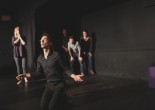
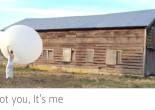
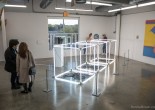
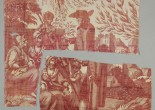

Pingback: Fleeing From Our Problems | VANDOCUMENT